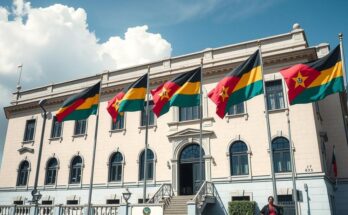The NPP’s recent election victory is viewed as a significant political upheaval in Sri Lanka, reflecting public anger towards corruption and a call for improved ethnic relations. Erik Solheim highlights the NPP’s unprecedented success across various demographics and urges the new government to pursue inclusive economic policies to maintain support and enable sustained growth.
Erik Solheim, a former Norwegian diplomat, has characterized the National People’s Power (NPP) electoral victory as an unprecedented transformation in the political landscape of Sri Lanka. In an interview, he noted that the NPP’s success in the November elections surpassed his expectations, highlighting a significant shift as the electorate welcomed a candidate from outside the traditional political elite. Solheim emphasized that this outcome illustrates deep-seated public frustration regarding corruption and socioeconomic disparities. The NPP, led by Anura Kumara Dissanayake, achieved a remarkable electoral milestone by securing 159 of 225 parliamentary seats, triumphing notably even in Tamil-majority regions. This victory represents a broad appeal that crosses ethnic lines, indicating a renewed hope for improved ethnic relations and political inclusivity in a country historically marred by ethnic tensions. Solheim reiterated the importance of the NPP addressing the aspirations of the Tamil community and adopting a strategy focused on economic growth to sustain its support. Additionally, Solheim pointed out that the political elite have historically failed to address the needs of the population, which contributed to the NPP’s appeal among disenchanted voters. He suggested that the NPP’s approach, which seeks to unify different ethnic groups and prioritize inclusivity, could be a pivotal factor in reshaping Sri Lankan politics for the better. Furthermore, he urged the new administration to focus on economic policies that promote equity and uplift underprivileged communities, emphasizing the necessity of engaging constructively with the Tamil and Muslim populations regarding their rights and governance issues.
The article discusses the recent electoral success of the National People’s Power (NPP) in Sri Lanka, contextualizing it within the ongoing struggles of the nation regarding ethnic relations and political corruption. This election is marked as a momentous shift in Sri Lankan politics and reflects the electorate’s dissatisfaction with the entrenched political elite and the desire for a new approach to governance. The NPP’s rise signals potential changes in ethnic dynamics, bringing hope for reconciliation between Sinhalese and Tamil communities after decades of civil conflict.
The electoral success of the NPP illustrates a significant shift in Sri Lankan politics, highlighted by the overwhelming support from voters frustrated with corruption and ethnic divisions. Erik Solheim underscores the importance of the new administration maintaining a focus on inclusivity and addressing the needs of marginalized communities, particularly Tamils and Muslims. This moment presents a unique opportunity for the NPP to establish itself as a transformative force that prioritizes economic growth and social equity, potentially altering the political landscape for years to come.
Original Source: thefederal.com




